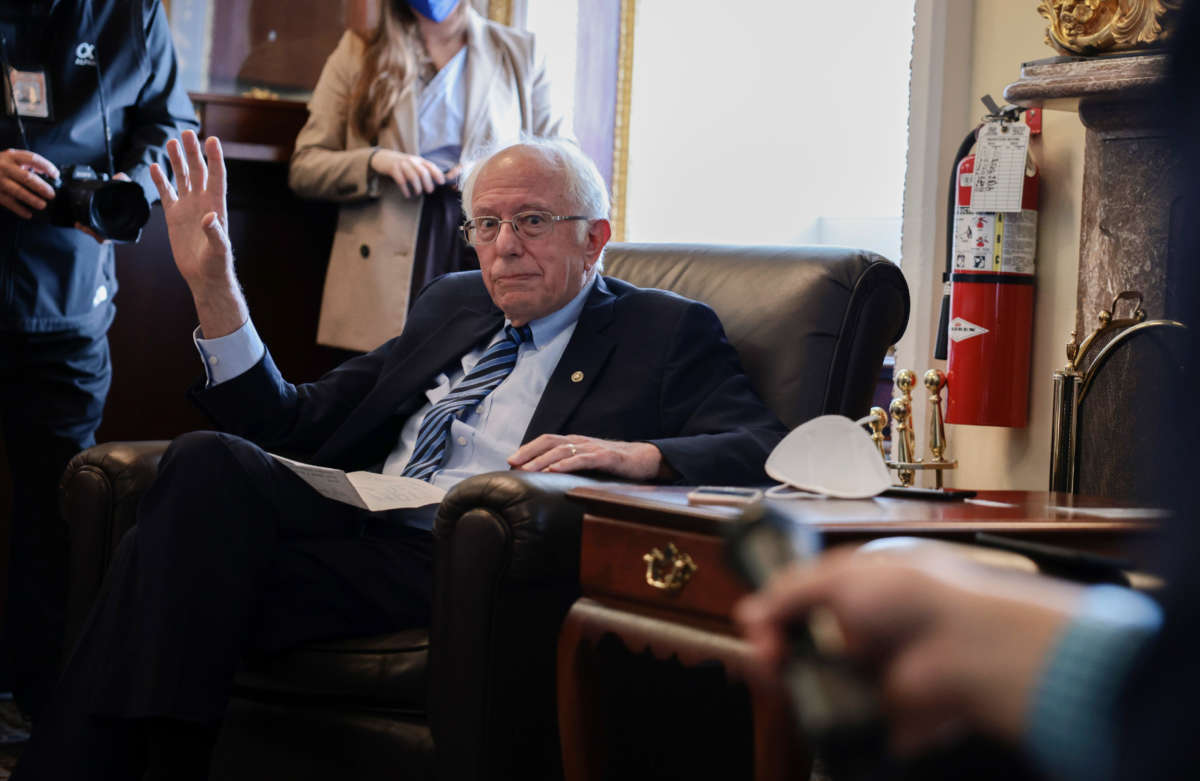Truthout is a vital news source and a living history of political struggle. If you think our work is valuable, support us with a donation of any size.
On Sunday, Sen. Bernie Sanders (I-Vermont) shared new polling that reveals overwhelming support for key elements of the Democrats’ Build Back Better Act, including the senator’s proposal to allow Medicare to negotiate prescription drug prices.
A poll of over 2,000 adults, conducted by CBS earlier this month, found that 88 percent of people surveyed support lowering prescription drug prices and 84 percent support expanding Medicare to cover dental, vision and hearing. A proposal for guaranteed paid family and medical leave is also popular, with 73 percent of those polled expressing their support.
The poll revealed majority support for several other major provisions in the bill, such as free community college, universal pre-kindergarten and tax hikes on corporations and the wealthy.
Sanders shared the polling results on Twitter, saying, “Maybe, just maybe, Congress might want to serve the needs of the American people, and not wealthy campaign contributors.” Several of the bill’s most popular provisions — including lowering drug prices and expanding Medicare — are provisions that Sanders has been fighting for over the past few months.
The CBS poll also highlighted that many people don’t feel they are knowledgeable about the specifics of the Build Back Better Act at all. Only 10 percent of respondents said that they knew “a lot of specific things” about the bill, whereas 29 percent said they didn’t know any specific details, and that they didn’t have a general sense of the bill’s content.
When asked whether they had heard more about the bill’s cost or about the policies included, 26 percent of respondents said they had heard more about the cost, while only 10 percent said they had heard more about the policies. 34 percent said they had heard both being discussed equally.
The poll also found that the most popular policies included in the bill were among the least well known. While 59 percent of respondents said they had heard about the bill’s price tag and 58 percent knew that it included tax hikes on the wealthy, only 40 percent said they had heard of the Medicare expansion and drug price negotiation proposals.
Sanders said that the fact that people are relatively unfamiliar with the bill’s contents is the fault of corporate news outlets. “Americans don’t know what’s in the Build Back Better plan because the corporate media doesn’t discuss it,” he said on Sunday. “Let’s stop the beltway gossip and start talking about lowering prescription drug costs, expanding Medicare, childcare and housing – and combatting [sic] climate change.”
Progressives have expressed frustration over corporate media’s coverage of the bill, especially when it comes to the bill’s $3.5 trillion price tag. Though the cost of the bill has received widespread coverage, progressive lawmakers and journalists have pointed out that the bill’s cost isn’t actually a lot of money, especially when considered in context with other government spending.
The bill would cost about $350 billion a year on average, which would be less than half of the amount of spending that Congress is slated to approve for the Pentagon. Sanders has also pointed out that it would be only about 1 percent of the nation’s projected Gross Domestic Product (GDP) over the next decade. Further, progressives and Democrats have emphasized that the cost of the bill is estimated to be offset completely by the proposed tax hikes, drug price negotiation and expansion of the Internal Revenue Service (IRS).
Despite the fact that most of its major proposals enjoy majority support from the public, conservative Democrats have been attacking the bill from every angle. In September, a group of Democrats in the House shot down the Medicare expansion and drug price negotiation proposals — and Democrats in the Senate are worried that Sen. Kyrsten Sinema (D-Arizona) may not be on board with the prescription drug proposals either. Of course, many of the Democrats opposed to these provisions have enjoyed generous campaign donations from the pharmaceutical industry.
A terrifying moment. We appeal for your support.
In the last weeks, we have witnessed an authoritarian assault on communities in Minnesota and across the nation.
The need for truthful, grassroots reporting is urgent at this cataclysmic historical moment. Yet, Trump-aligned billionaires and other allies have taken over many legacy media outlets — the culmination of a decades-long campaign to place control of the narrative into the hands of the political right.
We refuse to let Trump’s blatant propaganda machine go unchecked. Untethered to corporate ownership or advertisers, Truthout remains fearless in our reporting and our determination to use journalism as a tool for justice.
But we need your help just to fund our basic expenses. Over 80 percent of Truthout’s funding comes from small individual donations from our community of readers, and over a third of our total budget is supported by recurring monthly donors.
Truthout has launched a fundraiser to add 432 new monthly donors in the next 7 days. Whether you can make a small monthly donation or a larger one-time gift, Truthout only works with your support.
